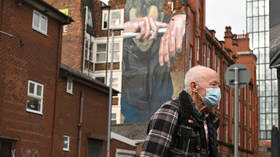Cynical mental health ‘experts’ are needlessly ramping up anxiety over the end of lockdown

As restrictions come to an end, mental health professionals are issuing alarmist warnings about our transition to freedom and turning people’s understandable anxiety about what lies ahead into a potentially major medical problem.
As we come out of lockdown, the role assigned to most of us by the mental health industry is that of anxious patients who should not be expected to deal with the transition to freedom.
Time and again, the public is told by mental health experts that they are unlikely to be able to re-enter the post-Covid-19 world without professional support. The sentiment is summed up by the title of a self-help article in the Telegraph: “We’re all suffering from cave syndrome – so here’s how to step into the light”. The implication of this statement is that leaving our caves may well turn into a traumatic experience.
Also on rt.com It’s totally wrong to turn Covid-19 into a ‘mental health crisis’Numerous experts are cited to explain why many of us are likely to be reluctant to embrace our new post-lockdown freedoms. According to one, “people have retreated inwards, they’ve had to. It’s normal habituation. We’re habit forming creatures. We get used to whatever is the current state of play.”
According to these experts, our reluctance to leave our homes can be diagnosed as ‘cave syndrome’, which is simply another way of saying that we do not want to leave our caves, or homes.
On closer inspection, it becomes evident that warnings about so-called cave syndrome and other lockdown-related ‘conditions’ are underpinned by an insidious agenda. The authors of these new syndromes are in the business of medicalising, and thereby normalising, a lack of appetite for freedom among sections of the public.
Instead of pointing out the problem of staying in our caves, the peddlers of new syndromes signal the idea that the fear of freedom is very natural and should be treated as a mental health problem rather than a social one.
By turning the transition to freedom into a major drama, these all too helpful professionals reinforce people’s anxiety about stepping out into the light.
It often appears as if the mental health industry is determined to ensure that we approach the post-pandemic as vulnerable, anxious patients, rather than as citizens desperate to embrace freedom.
Numerous mental health entrepreneurs have either consciously or unwittingly reinforced people’s fear of ending the lockdown. They have been busy lecturing the public not to be in too much of a hurry to leave behind our lockdown lifestyle because we face a variety of post-pandemic related disorders.
Often, they present the post-lockdown era as a mental-health dystopia. In some instances, the Covid-19 pandemic is presented as a precursor of a mental health disaster.
Also on rt.com Lockdowns were deemed bad for our mental health. Now the psycho-babble industry’s inventing anxiety about a return to normal lifeSteven Taylor, a professor and clinical psychiatrist at the University of British Columbia claims that “there will be people who develop chronic mental-health problems” caused or exacerbated by the pandemic. He anticipates a surge of “prolonged grieving disorder,” a condition that apparently affects about 10% of bereaved people. Taylor claims that this condition only becomes apparent months after the death of a loved one and can last indefinitely.
Sadly, now that the post-pandemic era is in sight, mental health professionals are busy inventing new problems to worry about. They claim that the return to normal life will be anything but normal. Expect ‘heightened levels of stress and anxiety’. One psychiatrist advises us to beware as “lockdown ends to avoid ‘re-entry’ syndrome.”
Re-entry syndrome simply means that most of us are likely to be a little bit anxious about returning to our old life. But by turning our normal reaction into a problem, professionals transform it into a medical issue that is likely to reinforce our anxiety. Unfortunately, during the past 18 months, the mental health industry has regarded the pandemic as an opportunity for turning this global disaster into a full-blown crisis, bombarding us with catastrophic stories about the threat that the pandemic represented to our psychological well-being. For example, the Times conveyed a mood of panic with an alarmist narrative about the tortured life of lockdown teenagers facing deteriorating mental health. In the UK, The Royal College of Psychiatrists asserted the closure of schools in lockdown threatened to unleash a mental health crisis among young children that will damage them for life.
No doubt many professionals mean to be helpful when they raise concerns about the mental health impact of this or that dimension of the pandemic experience. But the cumulative outcome of their alarmist warnings about our transition to freedom is to unwittingly make the situation worse.
By cultivating a sense of powerlessness, the new syndrome-mongers reinforce our sense of vulnerability. In effect, they distract people from coming to terms with an uncertain future.
If society is to move forward it must learn to embrace the uncertainty that accompanies our freedoms. That is why we must not let them medicalise our natural concerns about the future.
We are mature citizens rather than helpless patients.
Think your friends would be interested? Share this story!
The statements, views and opinions expressed in this column are solely those of the author and do not necessarily represent those of RT.














